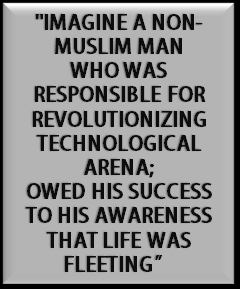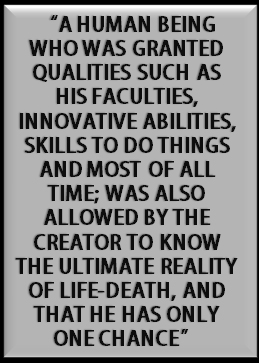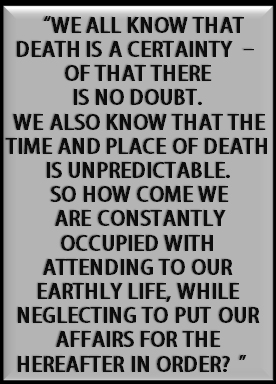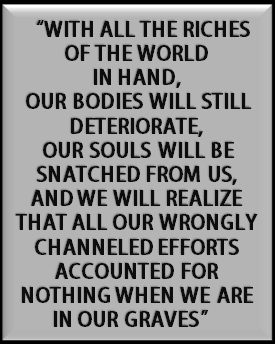|
|||||||||||||||||||||||||||

|
|||||||||||||||||||||||||||
 |
|||||||||||||||||||||||||||
|
|
|||||||||||||||||||||||||||
|
|
There Is No Wisdom
|
||||||||||||||||||||||||||
Index
|
History has witnessed the rise and fall of great men, powerful leaders and iconic businessmen. Last year witnessed the passing of Steve Jobs, the CEO of Apple Computer and Pixar Animation Studios. Steve Jobs's commencement speech at Stanford University on 12 June 2005 is one of the most often repeated texts, and his saying "Stay Hungry. Stay Foolish" has in itself become as iconic as the instantly recognisable Apple logo. |
His life started by, as he said, connecting the dots. He is often cited as one of the phenomenal examples that one does not need a university degree to succeed financially, and was perhaps the most successful example of a college dropout in the business world.
By a series of coincidences, it was his calligraphic classes that he took as a college dropout that triggered an idea ten years later, resulting in the first Mac computer being the first in the market to have beautiful calligraphy. To quote his speech:
"
you can't connect the dots looking forward; you can only connect them looking backwards. So you have to trust that the dots will somehow connect in your future. You have to trust in something your gut, destiny, life, karma, whatever. This approach has never let me down, and it has made all the difference in my life."
 |
Success followed success, although at the ascent of his career, he was publicly dismissed once Apple, being the company he started, fired him due to divergent business values. It turned out that being fired from Apple was the best thing that could have happened to him at the time, as it relieved him of the burden of success, and freed him up to enter one of the most creative periods of this life. It was during this time that he started another company named Pixar, got married and started a family. |
|
As he eloquently put it "I'm pretty sure none of this would have happened if I hadn't been fired from Apple. It was awful tasting medicine, but I guess the patient needed it. Sometimes life hits you in the head with a brick. Don't lose faith." The third part of his speech was about death. As he somberly puts it, upon hearing a quote when he was seventeen, which went along the lines of "If you live each day as if it was your last, someday you'll most certainly be right" he questioned himself every morning that it today were the last day of his life, would he want to do what he was about to do that day? His observation was "Remembering that I'll be dead soon is the most important tool I've ever encountered to help me make the big choices in life. Because almost everything all external expectations, all pride, all fear of embarrassment or failure - these things just fall away in the face of death, leaving only what is truly important. Remembering that you are going to die is the best way I know to avoid the trap of thinking you have something to lose. You are already naked. There is no reason not to follow your heart" |
 |
The above philosophies were applied by Steve Jobs in the arena of his professional life, and it contributed to his meteoric rise to fortune. The ideas emulated by him have been memorized and followed, the wake of his death witnessed thousands of mourners grieving and commemorating his loss. His ideas had almost raised him to some sort of divine status in the eyes of his fans. His life, and death, affected thousands. His legacy in this world was a technological revolution, which left an impact, and a gap that will take time to fill. |
Imagine if he had channeled some of his wisdom and genius in the path of the divine truth, how much of a better legacy he would have left in this world and in the hereafter. The speech above alludes more than once to basic principles of Islam such as divine predestination and awareness of one's own mortality, yet, in all his brilliance, he never quite joined the dots that mattered the ones that related to his everlasting soul.
Many times in his life as successful, and from a purely earthly benchmark, it was. He left behind assets worth billions of dollars, and had enjoyed a successful and long term marriage. By most human standards, his life was an astounding success.
|
Yet, ultimately, his assets could not buy the technology to save his life. When it was ordained for his heart to stop beating, nothing in this world, not even the best team of doctors, could have prevented it. Hence, the question is, what was the value of his life, if he did not believe in the Creator? The technological empire left behind will, like all other empires, come to their natural end. It will be superseded by fresher technology and ideas, and in less than a generation, and even less than a decade, his legacy on this earth would be obsolete. |
 |
Imagine a non-Muslim man who was responsible for revolutionizing technological arena; owed his success to his awareness that life was fleeting. A human being who was granted qualities such as his, faculties, innovative abilities, skills to do things, and most of all time; was also allowed by the Creator to know the ultimate reality of lifedeath, and that he has only one chance. The realization and awareness of death struck him when he was seventeen, and although for every subsequent day of his life, he was mindful of death, he was only mindful of it from the material aspect. He was only mindful from it in terms of maximizing his success in life. He sought to achieve everything possible, in awareness that his days were numbered, except preparation for the journey after death.
 |
Now the question arises that what is the value of this life full of achievement and success when I am going to die? And what am I going to take with me after death? What kind of service to me and to mankind are we referring to? And what kind of legacy can we leave after death? Let's stop for a moment and go back to the Creator. The Creator creates and He chooses whom He wills. The greatest chosen beings were Messengers and Prophets. They lived and died for only one goal and that was to acknowledge, believe in and carry the divine message to mankind. These people are the true achievers with the ultimate legacy. |
It is an occasion for all of us to ponder what our purpose in life is and what kind of legacy are we going to leave behind.
We all know that death is a certainty of that there is no doubt. We also know that the time and place of death is unpredictable. So how come we are constantly occupied with attending to our earthly life, while neglecting to put our affairs for the hereafter in order?
What of our careers, houses and cars can help us in our lives in the hereafter? Why do we think that the finish line for us is in our material successes, and exhaust all our efforts only for material life?
Allah grants us what we want, as evidenced in the following verse:
 |
That man can have nothing but what he strives for (Quran An-Najm Chap 53 Verse:39) |
And the loser is one who with all his intelligence and characteristics, never works for the hereafter.
May Allah SWT allow us to have true belief and allow us to gain wisdom from all His signs. May He allow us to be successful in the true sense of the word and leave a legacy like that of Ibraheem, Hagar, Ismaeel and other obedient slaves of His. Ameen.

If You Liked This Article, Please Download it, Print it, and Share it:
Just 'Right-Click' on the button of your choice and choose 'save target as'






